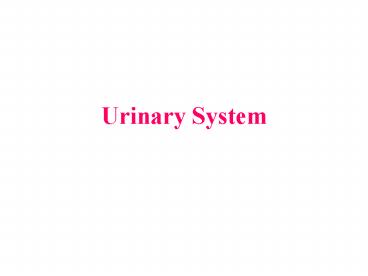Urinary System - PowerPoint PPT Presentation
1 / 11
Title:
Urinary System
Description:
loss of muscle, elasticity of bladder wall. less able to expand (stretch) and contract ... palpation, PSA test. Age Related Dysfunction. Renal Calculi - Kidney Stones ... – PowerPoint PPT presentation
Number of Views:65
Avg rating:3.0/5.0
Title: Urinary System
1
Urinary System
2
Review of Structure and Function
3
(No Transcript)
4
(No Transcript)
5
(No Transcript)
6
Age Related Changes
Kidneys - thickening of capsule, decrease
cortical mass decrease renal blood flow
(RBF) decrease of glomeruli GFR decreases
50 by age 80 general atrophy, dec. mass 30 by
age 80 altered permeability of
glomeruli proteinuria loss of
tubules decreased ability to concentrate
urine decreased ability to regulate pH loss of
reserve capacity
7
Age Related Changes
Bladder and Urethra loss of muscle, elasticity
of bladder wall less able to expand (stretch)
and contract decreased max. volume increased
residual volume inc. risk of bladder
infections more frequent urination nocturia-
3 or more X/night
8
Age Related Dysfunction
Urinary Incontinence - involuntary passage of
urine 30 of all people over 65 suffer some
degree weakening of the bladder
sphincters loss of control of external sphincter
muscle weakening in muscles in the pelvic
floor (post-menopausal women)
9
Age Related Dysfunction
Problems Caused by Prostate Benign
hyperplasia enlarges, compressing
urethra decline in urine flow rate can impede
flow Adenocarcinoma of the prostate 50 of
men over 70 !! Slow growing, only 1/3 become
clinically significant urethral
obstruction palpation, PSA test
10
(No Transcript)
11
Age Related Dysfunction
Renal Calculi - Kidney Stones most common in
middle-aged men may obstruct urine
flow Calcium oxalates - electron dense Urate
salts - not visible on X-ray Risk
Factors hyperparathyroidism diet dehydratio
n gout































